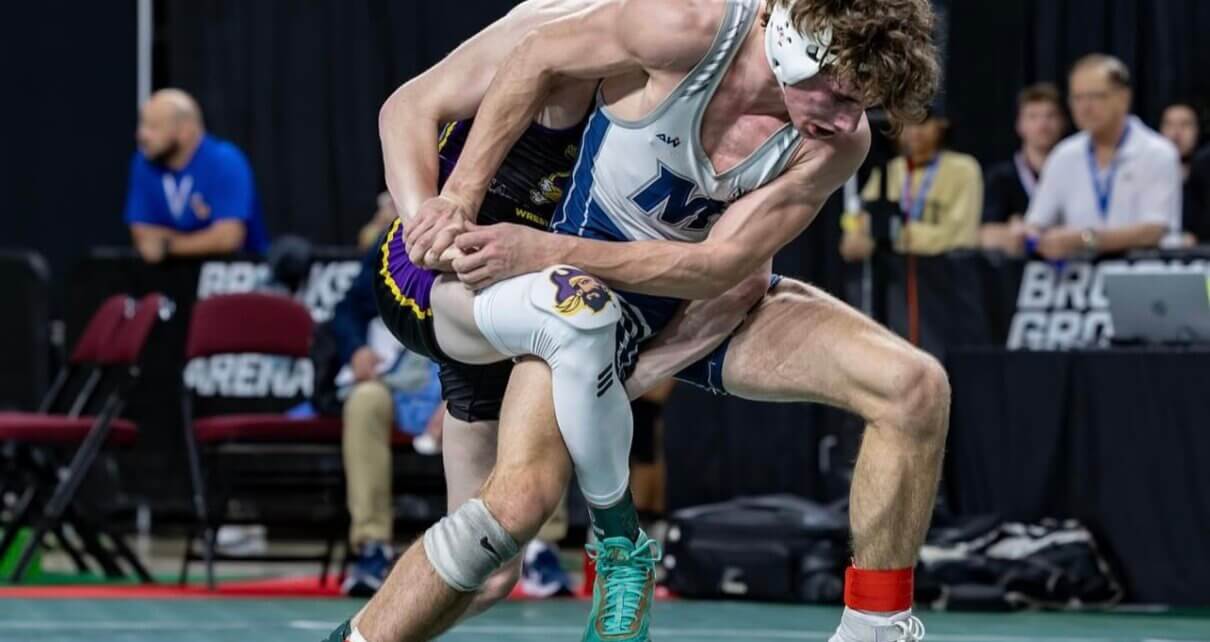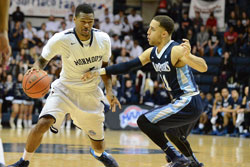O n Mar. 12, three athletes from the Monmouth Wrestling Club traveled to the Brookshire Grocery Arena in Shreveport, Louisiana, to compete in the National Collegiate Wrestling Association National Championships. While their accomplishments deserve recognition, their story extends beyond thier victories on the mat. The club is fighting for success in competition and the acknowledgment and support needed to elevate the program to Division I, joining the ranks of other athletic programs on campus.
The three Wrestling Club athletes earned their place in Louisiana through standout performances this season. Current senior captain Luke Petaccia, his co-captain and rising senior John Dooley, and freshman Noah Niemiera each represented Monmouth on the national stage, demonstrating talent and dedication and competing until the last possible week in the season. Petaccia took fourth in the Bob Quade Cyclone Open and third in the Mid East Regional tournament, qualifying him for nationals. Dooley is now a two-time regional champion for Monmouth and went 11-2 in his 2025 matchups. Niemiera became the first freshman throughout the club’s history to compete at nationals. Additionally, following the conclusion of their season, both Dooley and Petaccia earned the title of NWCA Scholar All-Americans.
Despite competing at the same level of difficulty and commitment as many other collegiate Division I programs, the Monmouth University Wrestling Club has yet to receive the honor of no longer being just a “club” team. “Honestly, the ‘club’ in our name is not justified. We wrestle in open tournaments that include teams from NCAA D1 all the way to D3. Monmouth County produces some of the best wrestlers in the country, and they just pass right through us to go wrestle D1 elsewhere. We’ve got the talent right here, we just need the platform to keep them home,” Dooley said. The transition from a “club” to D1 involves key legal hurdles, including Title IX, budgeting, scholarships, and making sure everything fits into the school’s athletic department. Yet the foundation for a varsity wrestling team is already in place, with only legal and financial restrictions standing in the way.
As of November 2019, before Monmouth’s move from the Metro Atlantic Athletic Conference to the Coastal Athletic Association, the university had an athletic budget of approximately seventeen million dollars, according to former athletic director Marilyn McNeil’s 2019 interview with the Asbury Park Press. With an already competitive roster, supporters argue that instead of allowing for talented athletes to walk right through West Long Branch, Monmouth should invest in recruiting and elevating a program that is already proving itself.
“As a student-run organization, we take pride in our accomplishments and will continue to grow and turn more heads. If we aren’t being recognized now, that’s ok, as it will come in due time,” Petaccia said. Besides the clubs’ own Instagram (monmouthwrestling) and Sigma Pi’s Fraternity on campus (sigmapimu), there was no publicity about this competition.
“We have three guys that attended one of the four biggest wrestling tournaments in the country, so it was really surprising when students didn’t know about it,” Niemiera said. For those on the mat, the need for recognition is not about validation– it’s about opportunity. Wrestling at a high level requires resources, exposure, and recruitment, all of which the club doesn’t get handed to them. Despite this, the team continues to work, doing what they can to help grow into a team.
Despite their successes, the financial battle to support the athletes is ongoing. Unlike CAA-funded programs, the team receives minimal financial assistance from the university. According to the club’s captains, they have gotten $3,500 total from the school specifically from the Student Government Association (SGA). However, this barely meets the requirements for what it takes to operate a competitive wrestling program. Most of their funding comes from the wrestling community– supporters willing to invest in the team’s future, such as friends, family members, or even the athletes themselves. “We’ve had thousands and thousands of dollars donated by people who believe in what we’re building,” said Dooley. “On Monmouth’s most recent Giving Days, we raised more than some of the Division I programs here, which says a lot. The support is real.”
One of the team’s biggest backers has been the Slendorn family, a name well known in New Jersey wrestling circles. Their contributions, as well as many others, have helped with the costs of traveling, housing, and any clothing necessary to be suited up for nations. Additionally, with funded programs with dedicated training facilities and personal trainers, the Monmouth wrestlers have found and created their own space to train and work. “We even built our own mat room on campus ourselves, just to practice,” said Dooley. None of their successes would be achievable without the guidance and motivation from their coach, Jake Benner. He wrestled for Ocean Township High School, where he was an individual state champion wrestler and obtained a record of 142-1. Later, he went on to wrestle at Rutgers University Division I program for four years and graduated in 2022. Now, he is training his team to follow a similar path as he did, with just as much success. “It is technically a club, but the athletes we have take it much more seriously than that. We have practices three to five days a week during our “season,” and although the practices are all optional, we almost always have full participation. It is really special to see everyone’s commitment to the team.”
Their ability to thrive despite these obstacles is a testament to the passion and determination within the program. But the question remains— if a team can raise this much outside support, compete at a high level, and draw attention from the wrestling community, why isn’t Monmouth investing in its success? The wrestlers believe the school already has the foundation for a Division I program, it just needs the commitment to make it happen. Dooley said, “Not to toot our own horn, but respectfully, we’ve done more than some of the D1 programs here. We’re proud, we’ve earned it, and the recognition is overdue.”



